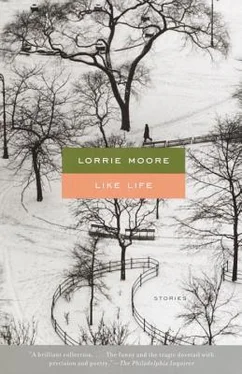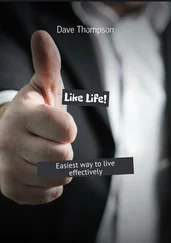Earl was still out on the balcony, alone, and Zoë rejoined him there.
“Hi,” she said. He turned around and smiled. He had straightened his costume out a bit, though all the secondary sex characteristics seemed slightly doomed, destined to shift and flip and zip around again any moment.
“Are you OK?” he asked. He had opened another beer and was chugging.
“Oh, yeah. I just had to go to the bathroom.” She paused. “Actually I have been going to a lot of doctors recently.”
“What’s wrong?” asked Earl.
“Oh, probably nothing. But they’re putting me through tests.” She sighed. “I’ve had sonograms. I’ve had mammograms. Next week I’m going in for a candygram.” He looked at her worriedly. “I’ve had too many gram words,” she said.
“Here, I saved you these.” He held out a napkin with two stuffed mushroom caps. They were cold and leaving oil marks on the napkin.
“Thanks,” said Zoë, and pushed them both in her mouth. “Watch,” she said, with her mouth full. “With my luck, it’ll be a gallbladder operation.”
Earl made a face. “So your sister’s getting married,” he said, changing the subject. “Tell me, really, what you think about love.”
“Love?” Hadn’t they done this already? “I don’t know.” She chewed thoughtfully and swallowed. “All right. I’ll tell you what I think about love. Here is a love story. This friend of mine—”
“You’ve got something on your chin,” said Earl, and he reached over to touch it.
“What?” said Zoë, stepping back. She turned her face away and grabbed at her chin. A piece of toilet paper peeled off it, like tape. “It’s nothing,” she said. “It’s just — it’s nothing.”
Earl stared at her.
“At any rate,” she continued, “this friend of mine was this award-winning violinist. She traveled all over Europe and won competitions; she made records, she gave concerts, she got famous. But she had no social life. So one day she threw herself at the feet of this conductor she had a terrible crush on. He picked her up, scolded her gently, and sent her back to her hotel room. After that she came home from Europe. She went back to her old hometown, stopped playing the violin, and took up with a local boy. This was in Illinois. He took her to some Big Ten bar every night to drink with his buddies from the team. He used to say things like “Katrina here likes to play the violin,” and then he’d pinch her cheek. When she once suggested that they go home, he said, ‘What, you think you’re too famous for a place like this? Well, let me tell you something. You may think you’re famous, but you’re not famous famous.’ Two famouses. ‘No one here’s ever heard of you.’ Then he went up and bought a round of drinks for everyone but her. She got her coat, went home, and shot a gun through her head.”
Earl was silent.
“That’s the end of my love story,” said Zoë.
“You’re not at all like your sister,” said Earl.
“Ho, really,” said Zoë. The air had gotten colder, the wind singing minor and thick as a dirge.
“No.” He didn’t want to talk about love anymore. “You know, you should wear a lot of blue — blue and white — around your face. It would bring out your coloring.” He reached an arm out to show her how the blue bracelet he was wearing might look against her skin, but she swatted it away.
“Tell me, Earl. Does the word fag mean anything to you?”
He stepped back, away from her. He shook his head in disbelief. “You know, I just shouldn’t try to go out with career women. You’re all stricken. A guy can really tell what life has done to you. I do better with women who have part-time jobs.”
“Oh, yes?” said Zoë. She had once read an article entitled “Professional Women and the Demographics of Grief.” Or no, it was a poem: If there were a lake, the moonlight would dance across it in conniptions. She remembered that line. But perhaps the title was “The Empty House: Aesthetics of Barrenness.” Or maybe “Space Gypsies: Girls in Academe.” She had forgotten.
Earl turned and leaned on the railing of the balcony. It was getting late. Inside, the party guests were beginning to leave. The sexy witches were already gone. “Live and learn,” Earl murmured.
“Live and get dumb,” replied Zoë. Beneath them on Lexington there were no cars, just the gold rush of an occasional cab. He leaned hard on his elbows, brooding.
“Look at those few people down there,” he said. “They look like bugs. You know how bugs are kept under control? They’re sprayed with bug hormones, female bug hormones. The male bugs get so crazy in the presence of this hormone, they’re screwing everything in sight: trees, rocks — everything but female bugs. Population control. That’s what’s happening in this country,” he said drunkenly. “Hormones sprayed around, and now men are screwing rocks. Rocks!”
In the back the Magic Marker line of his buttocks spread wide, a sketchy black on pink like a funnies page. Zoë came up, slow, from behind and gave him a shove. His arms slipped forward, off the railing, out over the street. Beer spilled out of his bottle, raining twenty stories down to the street.
“Hey, what are you doing?!” he said, whipping around. He stood straight and readied and moved away from the railing, sidestepping Zoë. “What the hell are you doing?”
“Just kidding,” she said. “I was just kidding.” But he gazed at her, appalled and frightened, his Magic Marker buttocks turned away now toward all of downtown, a naked pseudo-woman with a blue bracelet at the wrist, trapped out on a balcony with — with what? “Really, I was just kidding!” Zoë shouted. The wind lifted the hair up off her head, skyward in spines behind the bone. If there were a lake, the moonlight would dance across it in conniptions. She smiled at him, and wondered how she looked.
Places to Look for Your Mind
THE SIGN SAID “WELCOME TO AMERICA,” in bold red letters. Underneath, in smaller blue, Millie had spelled out John Spee. Comma, John Spee. She held it up against her chest like a locket, something pressed against the heart for luck: a pledge of allegiance. She was waiting for a boy she didn’t know, someone she’d never even seen a photograph of, an English acquaintance of her daughter Ariel’s. Ariel was on a junior semester abroad, and the boy was the brother of one of her Warwickshire dormmates. He was an auto mechanic in Surrey, and because he’d so badly wanted to come to the States, Ariel had told him that if he needed a place, he could stay with her parents in New Jersey. She had written ahead to inform them. “I told John Spee he could stay in Michael’s old room, unless you are still using it as an ‘office.’ In which case he can stay in mine.”
Office in quotation marks. Millie had once hoped to start a business in that room, something to do with recycling and other environmental projects. She had hoped to be hired on a consultant basis, but every time she approached a business or community organization they seemed confounded as to what they would consult her for. For a time Millie had filled the room with business cards and supplies and receipts for various expenses in case she ever filed a real tax form. Her daughter and her husband had rolled their eyes and looked, embarrassed, in the other direction.
“Office.” Ariel made her quotation marks as four quick slashes, not the careful sixes and nines Millie had been trained long ago to write. There was something a bit spoiled about Ariel, a quiet impudence, which troubled Millie. She had written back to her daughter, “Your father and I have no real objections, and certainly it will be nice to meet your friend. But you must check with us next time before you volunteer our home. ” She had stressed our home with a kind of sternness that lingered regretlessly. “You mustn’t take things for granted.” It was costing them good money to send Ariel abroad. Millie herself had never been to England. Or anywhere, when you got right down to it. Once, as a child, she had been to Florida, but she remembered so little of it. Mostly just the glare of the sky, and some vague and shuddering colors.
Читать дальше












